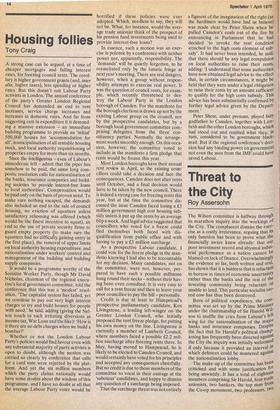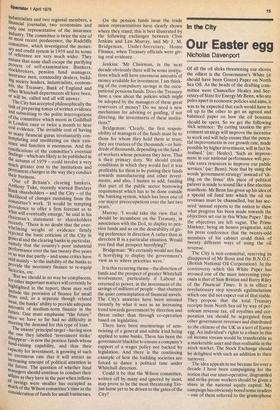Threat to the City
Roy Assersohn
The Wilson committee is halfway through its marathon inquiry into the workings of the City. The complacent dismiss the exercise as a costly irrelevance, arguing that its only function has been to prove what the financially aware knew already: that our poor investment record and abysmal industrial performance as a nation cannot be blamed on lack of finance. OverwhelminglY the evidence so far, both written and oral, has shown that it is business that is reluctant to borrow in times of economic uncertainty rather than the banks and the rest of the investing community being reluctant nr unable to lend. This particular socialist sacred cow has thus been destroyed.
Born of political expediency, the coin' mittee was set up by the Prime Minister under the chairmanship of Sir Harold W11son to muffle the cries from Labour's left wing for the nationalisation of the miler banks and insurance companies. Despite the fact that Sir Harold's political chairic" ioning has frequently been directed agains! the City the inquiry was initially welcome.° if only because it provided an interval which defences could be mustered against the nationalisation lobby. The make-up of the committee has been criticised and with some justification for being unwieldy. It has a total of eighteen ' members comprising Sir Harold, four trade unionists, two bankers, the top man fro° the Co-op movement, two professors, tvi° industrialists and two regional members, a financial journalist, two economists and ?lily one representative of the insurance industry. The committee is twice the size of Its most recent predecessor, the Radcliffe committee, which investigated the monetary and credit system in 1959 and its terms of reference are very much wider. They ensure that none shall escape the purifying Process of self-examination. Bankers, stockbrokers, pension fund managers, insurance men, commodity dealers, building leaders, industrialists, economISIS, the Treasury, Bank of England and Other Whitehall departments all have been, or will be, called and all will answer. The City has accepted philosophically the task of preparing tomes of written evidence and submitting to the polite interrogations Of the committee which meets in Guildhall In London once or twice a month to hear oral evidence. The invisible cost of having SO many financial gurus involuntarily contemplating and meditating on their existence and function is enormous. And the ramifications of the committee's eventual findings —which are likely to be published in the autumn of 1979 — could involve a very much greater cost to the institutions and Permanent changes in the way they conduct their business.
One of Britain's clearing bankers, Anthony Tuke, recently warned Barclays ank shareholders — and the City — of the likelihood of changes stemming from the committee's work. 'It would be tempting Providence to offer a firm forecast as to What will eventually emerge,' he said in his chairman's statement to shareholders recently. 'There is no doubt that the overwhelming weight of evidence firmly rejected the basic criticism of the City in general and the clearing banks in particular, namely that the country's poor industrial Performance over the last twenty-five years nr.so was due partly — and some critics have said mainly — to the inability of the banks to provide the necessary finance to re-equip factories, etc.
'But we should in no way be complacent, for other important matters will certainly be !hghlighted in the report; these may well
include the provision of finance for small fi. rills and, as a separate though related
issue, the banks' ability to provide adequate !Mounts of medium-term finance in the future. One must emphasise "the future" since we have so far had no difficulty in Meeting the demand for this type of loan.' The unions' principal target —having seen the one they labelled 'investment strike' di - sap ar — is now the pension funds whose
fund-raising capability, and thus their capacity for investment, is growing at such an enormous rate that it will attract an Increasing amount of political attention in the future. The question of whether fund Managers should continue to conduct their affairs as they have in the past when inflows Of savitigs were smaller has occupied as Much of the Wilson committee's time as the consideration of funds for small businesses.
On the pension funds issue the trade union representatives have clearly shown where they stand; this is best illustrated by the following exchanges between Clive Jenkins and Len Murray, and Mr J. M. Bridgeman, Under-Secretary, Home Finance, when Treasury officials were giving oral evidence.
Jenkins: 'Mr Chairman, in the next decade obviously there will be some instilutions which will have enormous amounts of money available for investment. I am thinking of the compulsory savings in the occupational pensions funds. Does the Treasury have a view about the policies which might be adopted by the managers of these great reservoirs of money? Do we need a new mechanism for advising or guiding, if not directing, the investments of these institutions?'
Bridgeman: 'Clearly, the first responsibility of managers of the funds must be to those for whom they hold them in trust; they are trustees of the thousands — or hundreds of thousands, depending on the fund — of workers whose pensions they have. That is their primary duty. We should create conditions in which they would feel it was profitable for them to be putting their funds towards manufacturing and other investments; and also, I hasten to add, funding that part of the public sector borrowing requirement which has to be done outside the banking system, which has been one of our major preoccupations over the last two years.'
Murray: 'I would take the view that it should be incumbent on the Treasury, in association with the Dol, to display to pension funds and so on the desirability of giving preference in direction A rather than in direction B in a particular situation. Would you find that prospect horrifying?'
Bridgeman: 'We certainly would not find it horrifying to display the government's view as to where priorities were.'
It is this recurring theme — the direction of funds and the prospect of greater Whitehall involvement, particularly if Labour is returned to power, in the investment of the savings of millions of people — that shatters the quiet contemplation of financial navels. The City's anxieties have been aroused recently by what it sees as an increasing trend towards government by direction and threat rather than through co-operation based on legislation.
There have been murmurings of armtwisting of a general and subtle kind being applied to some banks. There has been the government blacklist to ensure a company's support of a wages policy not backed by legislation. And there is the continuing example of how the building societies are forced to dance a political tune under Whitehall direction.
Could it be that the Wilson committee, written off by many and ignored by most, may prove to be the most threatening Trojan horse yet to be driven to the gates of the City?



































 Previous page
Previous page